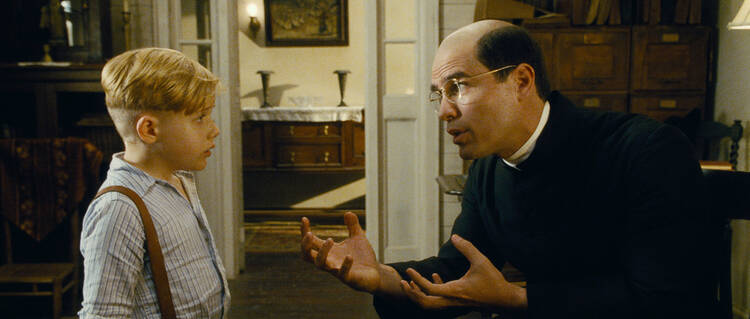I have a soft spot for flawed movies that explore the deeper questions of life.
Well-meaning films with a Catholic spiritual or religious theme tend to interest me in particular. That’s why “Little Boy,” released to DVD on Aug. 18 and scheduled to debut tomorrow (Sept. 15) on Netflix and Redbox, grabbed my attention when I saw it in theaters earlier this year. See America's favorable review here.
From Metanoia Films, an independent studio that produced the Toronto Film Festival sleeper hit “Bella” in 2006, “Little Boy” (PG-13, 99 minutes) embodies many virtues and vices of current Christian films. Self-consciously retro, it strives hard for simplistic values, reaching into the past for a World War II-based plot with only modest success. While this kind of movie would have been commonplace 50 or 60 years ago in Hollywood, today it feels like an anachronism, albeit a pretty entertaining one.
The story and cast are surprisingly engaging for this kind of movie, lending it an appearance of high production values. In a fictional California coastal town, 7-year-old Pepper Flynt Busbee (Jakob Salvati) is devastated when his dad (Michael Rapaport) ships out to the Pacific with the U.S. Army. Hearing the admonition of Matthew 17:20 that anyone with “faith the size of a mustard seed” can move mountains in church one day, the undersized kid (called “Little Boy” by townspeople) asks God for help in getting his dad to come home. Pepper soon moves from childish fantasies about a famous magician named Ben Eagle (Ben Chaplin) to the magical belief that his faith will save his dad if he concentrates on God hard enough.
The young associate pastor (Eduardo Verastegui) at Pepper’s parish has no time for the boy’s superstitions. But the wise pastor Father Oliver (Tom Wilkinson) encourages Pepper to forget about magic and instead follow God by working through the hatred he feels for the Japanese. Giving Pepper a checklist with the seven corporal works of mercy on it, the priest adds an eighth task: Make friends with Mr. Hashimoto (Cary-Hiroyuki Tagawa), a despised Japanese-American resident who has just returned from an internment camp.
As Pepper strives to overcome the influence of a local racist (Ted Levine) on his older brother, their mom (Emily Watson) likewise struggles to fend off the unwelcome advances of a local doctor (Kevin James) who begins to move in on her when it seems her husband won’t be coming home.
Great Acting, Weak Script
Unlike many low-budget Christian indie releases, “Little Boy” has a high-quality gloss and is full of excellent acting. Wilkinson gives a smart and sensitive performance as the commonsense priest and Watson conveys nuanced suffering in her underwritten role as the mom; Verastegui, Chaplain and James play their roles for some deft laughs. And Tagawa, perhaps the most recognizable Japenese-American actor working in film and television, gives an utterly dignified performance in a heartfelt role that could easily become clichéd. Finally, Levine is tormented as the resentful bigot and Rapaport is sweet as the mechanic-turned-soldier dad—the kind of decent person one hopes will return to his family. But Salvanti steals the show as the titular hero, giving as good a performance as anyone can expect from a child actor nowadays.
Unfortunately, Alejandro Gómez Monteverde’s excellent direction (also a virtue in “Bella”) fails to redeem a contrived script. At two key moments in particular, manipulative plot twists nearly wreck the film entirely. The first occurs when the film attempts to link Pepper (“Little Boy,” remember?) to the atomic bombs dropped on Hiroshima and Nagasaki, trivializing and perhaps subtly justifying a horrific attack that put the United States in a morally ambivalent light. The second arises when the film, on the verge of dramatizing the real emotions of a Christian believer coping with inexplicable suffering, suddenly pulls the rug out from under viewers with a pat resolution.
In the end, however, the movie scores as a thoughtful and provocative look at Catholicism through the eyes of a young boy. While it refuses to truly engage the question of why good people suffer, opting for an artistically compromised response, it succeeds at dramatizing a faith-based response to serious issues like racism and family separation. Like last year’s excellent “St. Vincent” with Bill Murray, but artistically inferior to that product, “Little Boy” is a flawed Catholic movie that makes the viewer think about Christian faith in a serious way.
Produced on a modest $20 million budget, “Little Boy” made only $6.5 million in a limited theatrical release that started on April 24 earlier this year, garnering poor reviews from most mainstream critics and accolades from some faith-based reviewers like Tim Drake at the National Catholic Register. In a positive secular review, however, Jackie K. Cooper of the Huffington Post called it “one of the best family films to come out of Hollywood in some time.”
He might be right. Check it out and see what you think.
Sean Salai, S.J., is a contributing writer at America.







